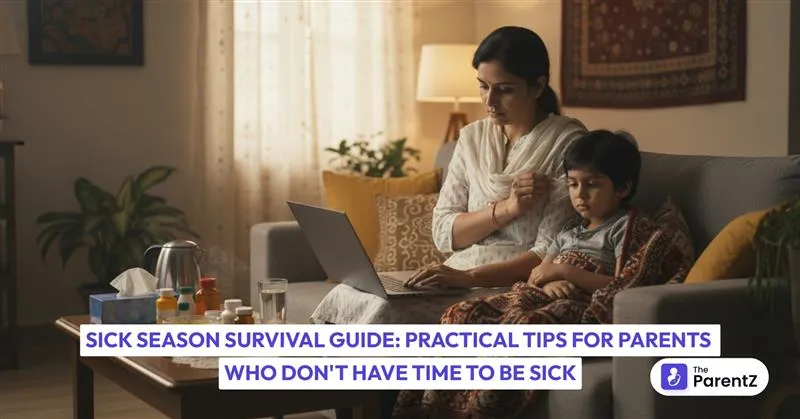If you’re a parent, you already know that October to December is the season when coughs, colds, and fevers seem to have an open invitation into every home. Whether it’s your child sneezing after school or your partner catching a viral bug from work, germs find ways to test every parent’s patience and stamina. And honestly, parents rarely have the luxury to fall sick. Between school runs, lunch packing, office work, and homework, even a mild flu can feel like a full-blown crisis.
So, here’s your sick season survival guide, filled with steps that actually work for busy parents who don’t have time to be sick.
#1. Keep Your Immunity on Track
Forget quick fixes and “immunity boosters.” The immune system isn’t built overnight; it runs best on balanced, daily care.
- Don’t skip protein: Include lentils, eggs, paneer, or nuts in your daily meals. Protein helps make antibodies that fight infections.
- Stay hydrated: Your body needs fluids to flush out toxins and keep mucous membranes moist (your first defense against viruses). Warm water, coconut water, or herb-infused water is perfect.
- Fuel with fruits and veggies: Winter veggies like carrots, spinach, beets, sweet potato, and fruits like oranges and guava are packed with Vitamin C, iron, and antioxidants.
- Get your sunlight: Fifteen minutes of morning sun keeps your Vitamin D levels stable and Vitamin D supports your immune function.
You don’t need any fancy supplements unless prescribed by your doctor; just make sure your plate looks colorful and balanced.
#2. Sleep Is the Strongest Medicine
It’s the one thing parents sacrifice first and it’s the one habit that decides your body’s resistance. Studies confirm that adults who sleep less than six to seven hours are three times more likely to catch a cold.
Try these realistic tweaks:
- Go to bed 30 minutes earlier, even if it means some chores wait till morning.
- Avoid late-night scrolling; the blue light messes with melatonin (your sleep hormone).
- Keep the bedroom quiet, cool, and dark.
- If you can’t get a long stretch of sleep, try 10–15 min power naps during the day.
Your immune cells regenerate during sleep. It’s not a luxury; it’s maintenance.
#3. Mask Up When It’s Needed
Masks aren’t just for pandemics. During flu season, they’re a simple way to cut your infection risk, especially if your child is coughing or you’re in crowded places like clinics, offices, or markets.
If a family member is sick:
- Keep a separate towel, mug, and pillow cover for them.
- Make sure rooms are well-ventilated.
- Use hand sanitizer regularly, especially before and after caring for your child.
These steps sound basic, but they’re exactly how you prevent “chain colds” that travel from one family member to another.
#4. Keep Germ Hotspots Clean
Germs don’t always sit where you expect. High-touch surfaces like door handles, phone screens, and light switches are the biggest carriers.
- Wipe these with a mild disinfectant daily.
- Change pillow covers and towels every 2–3 days during the sick season.
- Open the windows in the bedrooms in the morning; sunlight naturally kills many airborne germs.
No need for expensive sprays as plain soap water and sunlight do most of the work.
#5. Manage Stress Before It Manages You
It’s hard to “stay calm” when you’re balancing school projects, office deadlines, and grocery runs, but chronic stress lowers your immunity faster than a poor diet does.
Try small, doable habits:
- Take five deep breaths before starting your day or any stressful task.
- Step outdoors for 10 minutes to stretch or take a short walk.
- Say no to unnecessary social obligations during sick season; it’s okay to protect your bandwidth.
A calm body fights infections better than a tired one.
#6. Keep a Family Health Corner Ready
Think of it as a small “first-aid and prevention” station at home. Keep:
- A thermometer and sanitizer
- Paracetamol (as advised by your doctor)
- A nasal saline spray for congestion
- Oral rehydration salts (ORS) for dehydration
- Your family doctor’s number pinned up
When symptoms start, acting early helps. Hydration, rest, and mild medication (if advised) can stop an infection from getting worse.
#7. Don’t Neglect Routine Health Checks
Parents often delay their own check-ups while focusing on their kids’ school health camps. But maintaining your health means your children stay protected too.
- Get your annual flu shot (it’s recommended for adults, not just kids).
- If you’re asthmatic or allergic, keep inhalers or prescribed meds handy.
- Check your Vitamin D and B12 once a year, as they’re often low in Indian adults and directly impact immunity and energy levels.
A quick doctor visit now can prevent long sick days later.
#8. Break the Guilt Cycle
Many parents push through fever or fatigue out of guilt, thinking, “There’s too much to do.” But pushing your body only delays recovery and spreads the infection further.
If you feel under the weather:
- Take a real rest day (even if that means ordering food or letting the laundry wait).
- Inform your child’s school that you’re unwell; it teaches them boundaries and self-care too.
- Ask for help from your partner, parents, or friends.
Remember, being a good parent also means being a healthy one.
Conclusion
Parents don’t get sick days, but we can reduce sick-season stress with simple, consistent care. This October-to-December stretch is all about balance: eating right, resting well, and protecting without panic. Your health is the base that holds the whole family together, so don’t let it slip on your to-do list.





Be the first one to comment on this story.